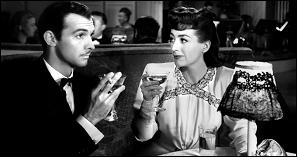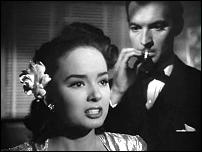Mon 26 Sep 2016
A Movie Review by Dan Stumpf: MILDRED PIERCE (1945).
Posted by Steve under Crime Films , Reviews[13] Comments
MILDRED PIERCE. Warner Brothers, 1945. Joan Crawford, Jack Carson, Zachary Scott, Eve Arden, Ann Blyth, Bruce Bennett, Lee Patrick, Moroni Olsen, Veda Ann Borg. Screenplay by Ranald MacDougall, based on the novel by James M. Cain. Director: Michael Curtiz.
I recently saw Mildred Pierce and came away just dumbfounded that anyone – even a Movie Critic – could watch this movie and fail to notice the strong, even idiosyncratic, hand of director Michael Curtiz at work. Take the opening: A mildly-surprised-looking Zachary Scott, seen in a mirror, shuddering under the impact of bullets hitting his frame, even as the mirror splinters and shatters, just as he hits the floor and rolls into full close-up before our eyes. In terms of screen time, it’s only a few seconds, but visually, it’s an incredibly complex blend of deft mise-en-scene and seamless editing, knowingly orchestrated by a master of the form.

Surprisingly enough, Curtiz manages to steer the film from this dizzy beginning through a palpaceous plot of Mother Love, Teenage Lust and Middle-aged Greed without once letting the pace falter. He keeps it right at the hungry edge of violence, like an addict staring at a needle, for nearly two hours’ fast-paced running time, and gets deft performances along the way from the likes of Bruce Bennett, Zachary Scott, Eve Arden, Ann Blythe and — inevitably — Joan Crawford.
Ah yes, Joan Crawford. In the role that revived her career. The cult of her personality, I fear, has always obscured the virtues of this remarkable film, just as Bogart’s cult “obscured” Casablanca: by shining so much Star Power on it that it ceased to be a film, and became instead a shrine, whence the Faithful are called several times a year to bask their idols in adoration.

Which offers a clue to Curtiz’ critical neglect: He was so good at enshrining major personalities (including Flynn, Cagney, Bette Davis and even Boris Karloff) that their fans always tended to overlook him — forgetting that gods do not exist until someone builds temples to them – and critics never noticed the consistent stylistic complexity that he lavished on even his minor films. Thus he became an “anonymous” director to folks who just wasn’t looking.
Getting back to Mildred Pierce, though, it’s a lavish blend of Mystery, Soap Opera and even pre-feminist rhetoric, and though the icons who populate this particular temple have remained somewhat critically unfashionable, the showcase itself deserves a fresh look.
September 26th, 2016 at 8:45 pm
Whatever Mildred the film is, it is not James Cain, who did not write an hysterical murder story.
September 26th, 2016 at 10:54 pm
In 1945, was there any way to film the novel anywhere close to how Cain wrote it?
Also, I’ve not seen the 2011 TV mini-series that was on HBO. Has anyone? I’ll have to go see if was ever released on DVD.
September 26th, 2016 at 11:28 pm
Why not? The other Cain adaptations, Serenade, probably could not have been filmed, but Loves Lovely Counterfeit has a far stronger, and different scenario than Slightly Scarlet. I personally enjoyed both, but essentially pointless as adaptations, whereas, for all its deviation, The Postman Always Rings Twice also rings
almost true.
September 26th, 2016 at 11:34 pm
Further thoughts about adaptations:
All of the Maltese Falcon variations are clearly adaptations of the original work, granted that some are better than others, but the inspiration is clear. For whatever reason, the only even vaguely closed adaptation of man In The Iron Mask is the Doug Fairbanks film, but all of the varied Monte Cristo pictures, while truncated and truly simplified, are like the Falcon, recognizable adaptations. Yes?
September 27th, 2016 at 3:58 am
Griping that this doesn’t follow the book is like complaining that Shakespeare’s RICHARD II is untrue to History; both are works of art in their own right, independent of source.
September 27th, 2016 at 9:16 am
See MILDRED PIERCE first; then watch Carol Burnett & Co.’s perfect parody, “Mildred Fierce,” here:
https://www.youtube.com/watch?v=fLfSiKI3DsM
Runs about nineteen and a half minutes.
September 27th, 2016 at 11:57 pm
Kate Winslet’s performance as Mildred Pierce is available on Blu and DVD discs from Amazon and I presume other sites.
September 28th, 2016 at 7:49 am
So I have discovered. Have you seen it, Barry? I’ve been reading the comments left there on Amazon. Many of them take the time to point out how close this HBO production stayed to the book.
September 28th, 2016 at 8:19 am
Exactly. I’ve not seen it, but will be doing so in the next week. Most people seem to have enjoyed the series, but a few, not much.
September 28th, 2016 at 9:37 pm
Curtiz is still neglected as a director because he directed so many films and so many types of films. He tends to upset the popular autuer theory of film making.
The HBO version was closer to the book.
DOUBLE INDEMNITY isn’t much like the Cain book either. Actually it’s better.
September 28th, 2016 at 10:06 pm
David, Double Indemnity has the same, or similar set up. It is at least an adaptation. My comments in no way reflect a value judgment on any of the finished film products as to better or worse, but I have a cranky personality that kicks in when something makes no sense. As in, an adaptation of a novel, that isn’t either an adaptation, or even a reflection other than in the broadest sense or the original work.
September 29th, 2016 at 3:23 am
David, we could write a book comparing/ contrasting the book/movie DOUBLE INDEMNITY. The novel is a clever essay on the existence of Evil. Chandler and Wilder added a human domension to the movie by working up the relationship between MacMurray and Robinson into a love story.
September 29th, 2016 at 6:21 pm
I wasn’t knocking Cain, but as a writer he often used the thematic devices that just don’t translate to the screen. In DOUBLE INDEMNITY it’s sharks and in SERENADE the iguana.
And, to be fair Hollywood wasn’t always ready for some aspects of Cain.